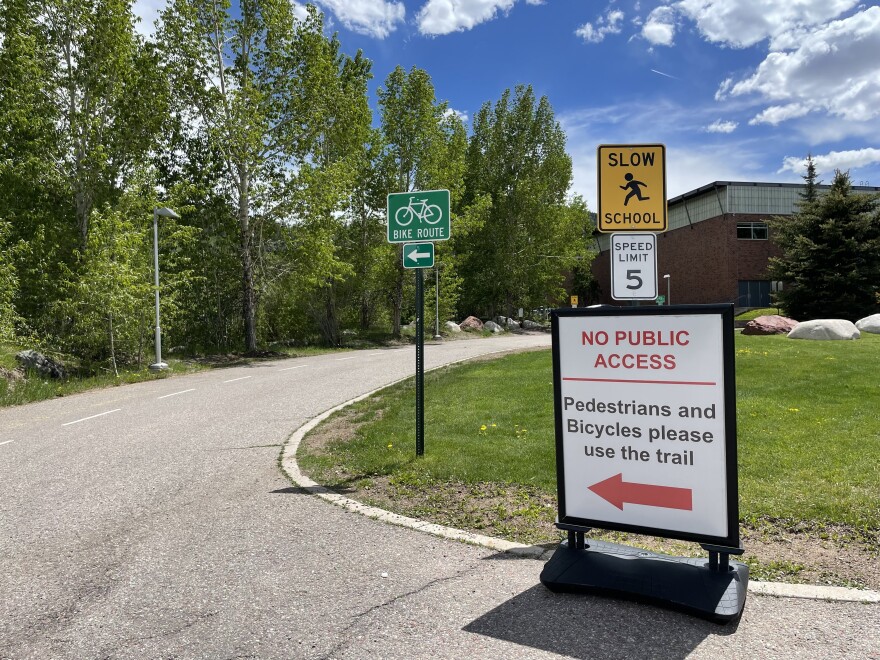The school shooting in Uvalde, Texas on May 24 shook students across the nation.
Students in the Roaring Fork Valley are coping with the fear of this tragedy coming to their schools and the numbness that comes from watching lots of mass shootings.
“I remember I was just sort of sitting down, and I got an email from a news source,” said Esmerelda Alverde Duarte, who is a sophomore at Roaring Fork High School in Carbondale. “I feel like I should have been more affected originally, but I was just like, oh, just another school shooting, unfortunately. And you sort of want to block it out.”
Alverde Duarte is just one of the students in the valley who said they felt unphased by the shooting.
Fatima Flores and Oceane Jones are juniors at Aspen High School.
Flores says when the news first broke, she wasn’t shocked.
“When I heard about it, obviously I was like, ‘Oh my God, this is horrible,’” said Flores. “But I was also not as surprised as I probably should have been.”
Jones felt the same way.
“We've had so many shootings that it almost doesn't faze us anymore,” said Jones.
But as more information was released, Jones learned about the families who lost loved ones.
She said those feelings of apathy began to change.
“It really, actually, made me really angry because … this has been happening for so long,” Jones said. “We have been accustomed, but we haven't done anything about it.”
It’s not just the students who feel this way.
Dave Baugh, superintendent of the Aspen School District, says he feels speechless.
“My entire leadership career has been dealing with the aftermath of school shootings,” said Baugh. “I was a first year principal when Columbine happened. You know, and we keep dealing with it over and over and over. And it's just heartbreaking.”
He says he’s disappointed and points to other countries who’ve implemented stricter gun laws in the wake of similar tragedies.
“Australia's figured it out,” said Baugh. “Great Britain’s figured it out. Canada has figured it out. And yet we can't seem to take a step forward in keeping our kids safe and our teachers safe.”
The Superintendent of the Roaring Fork School District, Rob Stein, agrees with Baugh.
In a column Stein wrote earlier this week in the Glenwood Springs Post Independent, he said, “We have seen too many senseless deaths of children due to gun violence … we need sensible gun regulation alongside the right to bear arms.”
And the students have some suggestions.
“I feel like maybe a certain age limit,” said Flores. “Because I don't think any kind of 18 year old, whether they're using it for a school shooting or not, should have their hands on a gun.”
Jones felt strongly about limiting access to certain weapons like assault rifles.
“If we maybe had better regulation of that gun or maybe banned it or maybe made it so you couldn’t have concealed carry, then I think things like this wouldn’t happen,” said Jones.
Alverde Duarte said deeper background checks could be helpful.
“Any new gun owner would need to have a thorough check with a doctor,” she said. “And then also a mental health therapist or a psychiatrist and then have to have yearly checkups as well.”
Schools Responding with Safety Measures
Schools across the country are trying to increase safety measures.
The Denver Public Schools announced after the Uvalde shooting that it would have a larger uniformed police presence in the district during the last two weeks of school.
The Roaring Fork School District installed various security improvements in 2015, including technology to monitor when a door is left ajar.
But Stein says there is a limit to what schools can do.
“Schools are made of breaking glass,” said Stein. “And were somebody really, you know, really committed to breaking into a school in school hours or after school hours. They're not fortresses. They're not banks.”
In his column, Stein listed some ideas for what he called sensible restrictions on firearms.
And he puts the responsibility of passing these regulations on the voters.
“Now I'm speaking as a citizen, as an individual,” said Stein. “It doesn't make a lot of sense to me that people can buy military style assault rifles at any age, but certainly at a younger age than they can buy beer. So I do think there's sensible regulation that can be put into place if our legislators can achieve a consensus. They've been unwilling to do so. And ultimately, that's our fault as voters.”
Baugh, the Aspen School District superintendent, agrees that there’s only so much the district can do to defend against military-grade weaponry.
The district is reconfiguring entrances to the schools over the next two years and changing keycard protocols.
But when organizations like the National Rifle Association have such a tight grip on members of Congress, he says it’s hard to imagine a path forward.
“Seems like the NRA has a chokehold on American leadership and they continue to overlook the opportunities for even the smallest change in how we approach gun ownership,” said Baugh.
And Flores believes that schools can’t keep kids completely safe without laws to support them.
“As much as the administrations tried to protect their students, there isn't that much hope for change unless we decide to change gun laws and realize that a piece of metal isn't worth a child's life,” she said.
Alverde Duarte thinks community sentiment has the power to influence lawmakers.
She makes a plea to adults across the country.
“Any adults out there hearing this, know that you have more power than we do as of right now,” Alverde Duarte said. “So anything that you do or decide not to do is going to directly impact us or other kids around the country who cannot have the same power as you do. Right now, the same amount of influence. So please, please do something.”



